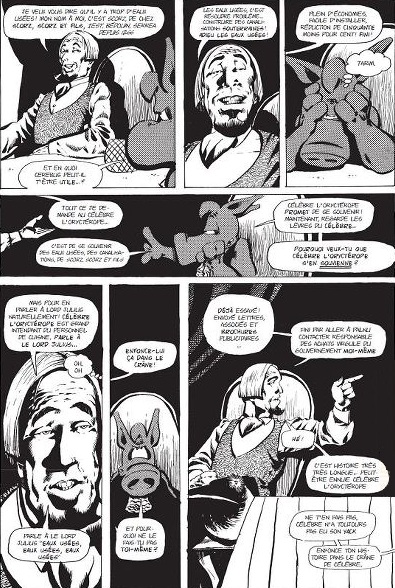Greg Hunter reviews Fukitor for The Comics Journal:
Intentionality becomes a consideration while reading comics like this. Here are two ways to consider “Operation Cockblock!”: 1) Karns uses satire as a pretext to include content that’s upsetting by design; 2) Karns’s ambitions as a satirist outstretch his gift for satire to such a degree that the story is a near-total failure. Not all art has a social intent, and not all art is best viewed in these terms, but we can certainly judge ostensible social comment by its follow-through. Fukitor manages little with respect to race except the visual parroting of hateful tropes.
It’s possible Karns doesn’t consider the reactions of readers while drafting his work. Not likely, but possible. If he does consider reactions, we can posit that shock is not merely expected but desired. So criticizing Fukitor because of its harsh content feels uncomfortably like playing a game that Karns has arranged. But Fukitor can also be critiqued on the grounds of its eventual boringness. By the end, viscera fall with plodding monotony.
As I’ve said before, there’s nothing shocking about Fukitor, satirical or otherwise. It just draws on the same wellsprings of racism, sexism and bullying as everything it’s “inspired” by. It’s the alternative comix version of Identity Crisis, a deeply cynical attempt to exploit aging fanboys’ confusion of maturity and adult material with asshole behaviour. Are we sure, in fact, that Jason Karns isn’t a Mark Millar pseudonym, because the trolling style is the same.
And if Fukitor is just a giant troll attempt, it’s overshadowed by that of its new publisher. The first book in Fantagraphics new F. U. imprint (and I see what you did there), it’s a clear statement of intent, and a giant troll to pretend that this book, out of all the interesting work being done, is good enough to launch this new imprint. One of the great things about Fantagraphics is that it has always been in the forefront in the fight for artistic freedom in comix, but it does lead them sometimes into tedious épater le bourgeois territory, like it seems to have done here. You can, if you squint, draw a line from certain of Crumb’s racist fantasies and Bagge’s more outrageous libertarian strips to what Karns does here, but it doesn’t make it more interesting, here in 2014, to again see yet more racist, sexist power fantasies get preferable treatment just because it offers the illusion of transgression, when in actuality it does nothing but riff on the same tired old stereotypes already all over mainstream media offerings.
